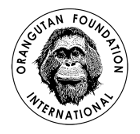Sometimes you encounter a person with a vision. While Orangutan Foundation International (OFI) President Dr. Biruté Mary Galdikas was in Spain as the keynote speaker at the Congress for Social Communication of Science in Burgos in 2019, she and a representative of OFI Canada, Ruth Linsky, were approached by Jorge Extramiana for a collaboration with… Continue reading Los Angeles based Orangutan Foundation International becomes the home of the World Biological Corridor in North America

